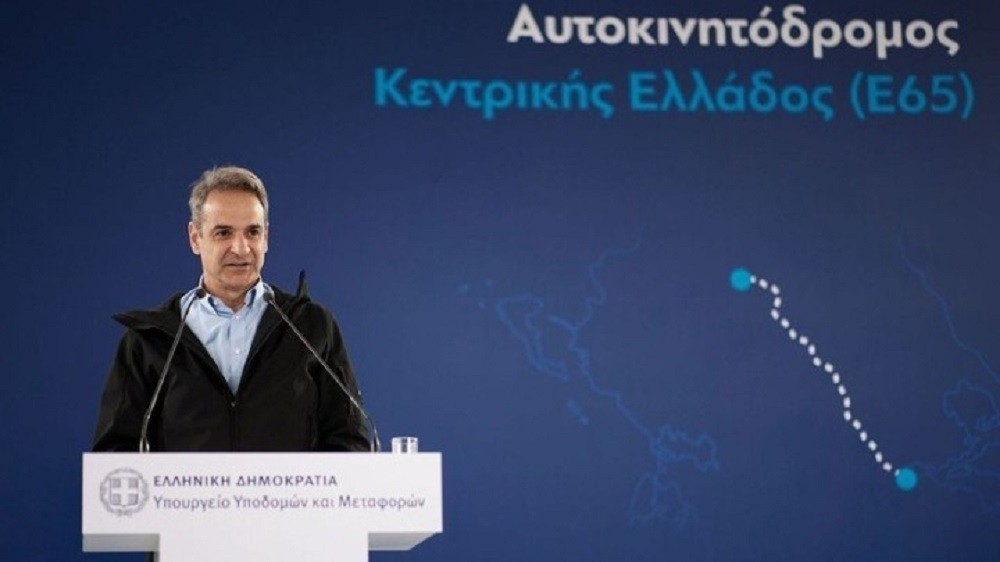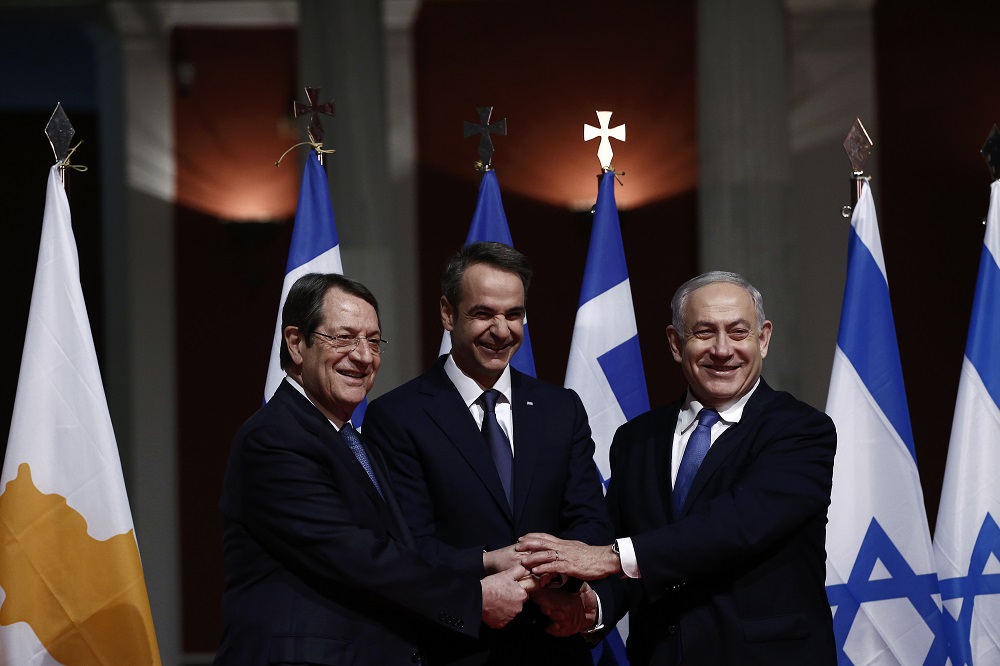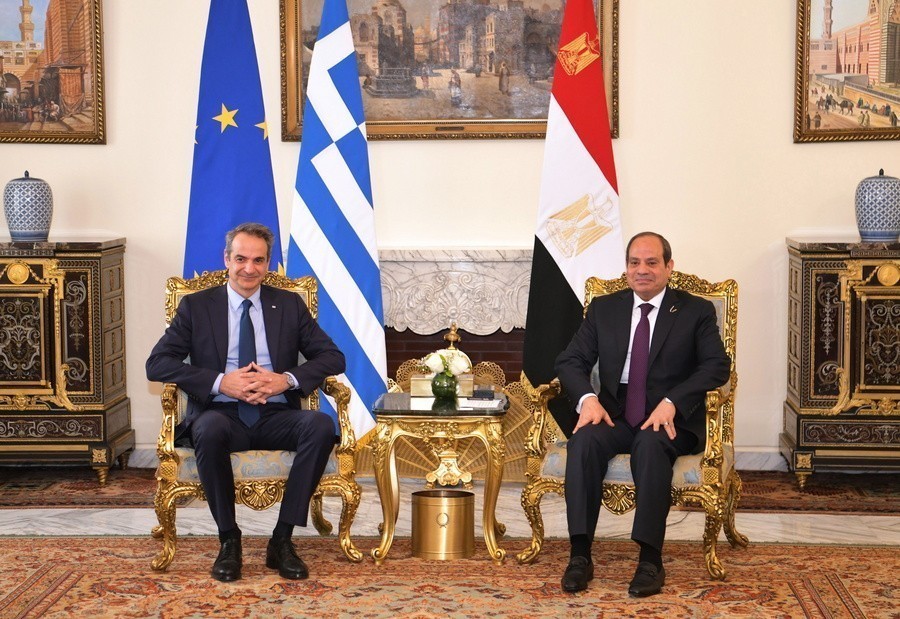
PM Mitsotakis: EastMed agreement instrumental to peace and stability in the region

Ο πρωθυπουργός Κυριάκος Μητσοτάκης (Κ) με τον Πρόεδρο της Κύπρου Νίκο Αναστασιάδη (Α) και τον πρωθυπουργό του Ισραήλ Μπενιαμίν Νετανιάχου (Δ), δίνουν τα χέρια κατά τη διάρκεια τριμερούς συνάντησής τους για τον αγωγό φυσικού αερίου EastMed, στο Ζάππειο Μέγαρο, Πέμπτη 02 Ιανουαρίου 2020. ΑΠΕ-ΜΠΕ, ANA – MPA, Y. Kolesidis
The energy ministers of Greece, Cyprus and Israel on Thursday evening signed the landmark EastMed pipeline agreement for a project that will carry natural gas from the East Mediterranean and Israel through Cyprus to Greece and Italy, eventually reaching the rest of Europe.
Ministers Kostis Hatzidakis, Israeli Energy Minister Yuval Steinitz and Cyprus’ Energy Minister Georgios Lakkotrypis signed on behalf of the three countries.
PM Mitsotakis: EastMed agreement the capstone of a new trilateral relationship
The EastMed pipeline agreement “is the capstone of this new geopolitical and commercial relationship, which has been systematically taking shape between Greece, Cyprus and Israel in recent years, creating a fresh energy hub in the eastern Mediterranean,” said Prime Minister Kyriakos Mitsotakis on Thursday, during a joint press conference with the leaders of Cyprus and Israel after the signature of a trilateral agreement.
The Greek PM underlined that this accord acts as a “bridge that will drive the region’s natural gas reserves to Europe, via Greece, to enrich the EU’s Energy Union with more environmentally friendly gas, but from a new route,” he added.
“Being one of the largest natural gas pipelines in the world, will, naturally, have positive consequences for participating countries,” Mitsotakis said, “ but it is also a contribution to peace and geopolitical stability, because it demonstrates the practical intention of our states to look at energy as bonding people’s cooperation, not as a cause for disagreement and conflict.
Mitsotakis emphasized that the new pipeline would enhance the geostrategic surplus value and regional role of Greece and Cyprus, thus “attaching strategic depth to our multitudinous cooperation with Israel and spreading an arc of prosperity that crosses the eastern Mediterranean to reach Italy and the European Union.”
The Greek premier then said that the expanding trilateral cooperation, “in conjunction with our very close traditional relations with Egypt and the moderate Arab world, is a guarantee of security in the wider region,” which has been threatened by conflict, change and revisionism in recent years.
EastMed offers more flexibility and independence to Europe’s energy sources, the PM noted, explaining the European Union’s support at all stages of its growth, as a project of common interest,” he said.
On Greece’s commitment to cease lignite production by the end of 2023, Mitsotakis stressed that “access to cheap natural gas is of great importance to Greece too.”
The prime minister added that the EastMed pipeline will help shape a new energy landscape “that respects and consolidates international law,” and highlighted how it is “strongly supported by the United States of America.” He also welcomed the vote by the US Senate on the Eastern Mediterranean Security and Energy Partnership Act, with was achieved by broad consensus, as he noted.
“EastMed, in conjunction with the construction of the Alexandroupolis floating storage and regasification unit (FSRU), is establishing our country as a crucial player in the energy supply of eastern and central Europe,” the prime minister said.
He pointed out that the pipeline benefits for Greece are many, as “they generate revenue from gas production, transportation and distribution in new areas and lower prices at the end market. We expect that this pipeline will, in the future, also transfer the energy resources we hope to find south of Cyprus – as well as in the Ionian Sea – to the European Union market.”
More important, he said, “this pipeline will also supply natural gas to areas of Greece that do not yet have access to the national gas grid, such as Crete, the Peloponnese and western Greece.”
Mitsotakis then welcomed the presence of energy ministers from previous governments who had attended the signing by invitation, as “our common interest must unite all political forces, especially in matters that have a national and international dimension.”
After thanking Cypriot President Anastasiades and Israeli Prime Minister Netanyahu for what he called their extremely fruitful cooperation, he concluded by saying that the pipeline is not a threat to anyone. This trilateral cooperation specifically, he said, is not directed against anyone.
In this context, he noted, regional co-operation is always open to all, “but relies on one basic condition, respect for international law and the rules of good neighborliness.”
‘EastMed pipeline project not directed against any other country,’ says Cypriot President Anastasiades
President of the Cyprus Republic Nicos Anastasiades dubbed the East Mediterranean Transnational Agreement (EastMed) natural gas pipeline a “historical landmark,” after it was signed by the three countries’ energy ministers in Athens on Thursday.
Speaking alongside the Prime Ministers of Greece and Israel, Kyriakos Mitsotakis and Benjamin Netanyahu, Anastasiades emphasized, “By signing this agreement we confirm, in the most concrete manner, that the cooperation we have developed in recent years is not limited to void-of-content theoretical declarations, but has matured to such an extent that we are now in a position to promote strategic projects of particular geopolitical value, in a practical, convincing way,” he added.
The EastMed pipeline project holds immense potential benefits not only for all three countries involved, but for the entire region, the realization of which will contribute greatly to the secure energy supply to the European Union, he said, adding that “the discovery of significant hydrocarbon reserves in the eastern Mediterranean can enhance partnerships and multiply their strategic value.”
“This is a belief,” he said, “shared by the majority of regional states, through the establishment of the Eastern Mediterranean Forum by Greece, Israel, Italy, Cyprus, Egypt, Jordan and Palestine, which has secured the full support of both the European Union and the United States of America.”
He underlined how “the EU’s decision to finance the technical design of the pipeline construction is by no means accidental.”
The Cypriot President asserted that the EastMed agreement “is not directed against any other country, but reinforces the common pursuit of peace, security and stability in the particularly vulnerable region of the East Mediterranean, on the basis of full respect for international law and the Law of the Sea.”
In conclusion, he said the three countries will also proceed with the Cyprus-Greece-Israel electrical interconnection via a submarine cable, also known as the EuroAsia Interconnector, which also happens to be fully endorsed by the EU.
Israeli PM Netanyahu: EastMed project contributing to stability and security in the region
This is a historic day for Israel, Prime Minister Benjamin Netanyahu said on Thursday, following the signing in Athens by energy ministers of Greece, Cyprus and Israel of the EastMed agreement on the construction of a natural gas pipeline.
At a joint press conference with Greek Prime Minister Kyriakos Mitsotakis and Cyprus President Nicos Anastasiades at Zappeion Hall, Netanyahu welcomed the agreement as one that strengthens Israel’s energy profile and adds to the stability and security of the area.
He also reiterated, in statements similar to those expressed by the other two leaders, that the agreement is not directed against any other country, but that the three countries work to support everyone’s values and the respective people’s interests. “We ask and invite any country that wishes so – starting with Italy, then Egypt – to contribute,” the Israeli premier said. “This will strengthen even further the collaboration in the area.”
Speaking of the relationships among the three countries, Netanyahu spoke of “a historic anomaly experienced by our countries: In Athens and Jerusalem we built the foundations of Western culture. Greece and Israel on one side, with Cyprus in the middle, we built values which have prevailed in humanity. But in the modern era, we see a lack of connection among us. We have corrected this.”
Thursday’s meeting of the three countries is the seventh in a row, he noted, and it upgrades their collaboration even more while working towards providing Europe with energy, a collaboration Israel would like to further enhance. Netanyahu especially mentioned the Leviathan deposits of natural gas as being particularly profitable for the future, and mentioned Israel’s signed agreements with its Arab neighbors, another factor contributing to peace, prosperity and good neighborliness in the region, he said.
Source: ΑΝΑ – MPA

